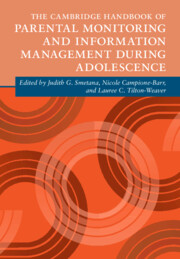Book contents
- The Cambridge Handbook of Parental Monitoring and Information Management during Adolescence
- Cambridge Handbooks in Psychology
- The Cambridge Handbook of Parental Monitoring and Information Management during Adolescence
- Copyright page
- Dedication
- Contents
- Figures and Tables
- Contributors
- Acknowledgments
- Part I History of the Field and Theoretical Frameworks
- Part II Reconsidering Parenting and Parental Knowledge
- Part III Informant and Contextual Differences in Disclosure and Secrecy
- Part IV Applications
- 18 Disclosure in Adolescents and Emerging Adults with Chronic Illness
- 19 Information Management and Adolescent Health
- Index
- References
19 - Information Management and Adolescent Health
Privacy and Disclosure
from Part IV - Applications
Published online by Cambridge University Press: 12 December 2024
- The Cambridge Handbook of Parental Monitoring and Information Management during Adolescence
- Cambridge Handbooks in Psychology
- The Cambridge Handbook of Parental Monitoring and Information Management during Adolescence
- Copyright page
- Dedication
- Contents
- Figures and Tables
- Contributors
- Acknowledgments
- Part I History of the Field and Theoretical Frameworks
- Part II Reconsidering Parenting and Parental Knowledge
- Part III Informant and Contextual Differences in Disclosure and Secrecy
- Part IV Applications
- 18 Disclosure in Adolescents and Emerging Adults with Chronic Illness
- 19 Information Management and Adolescent Health
- Index
- References
Summary
Adolescents’ ability to access health care depends on sharing accurate information about concerns, needs, and conditions. Parents and other adults serve as both resources and gatekeepers in adolescents’ ability to access and manage care. Understanding information sharing between adolescents and parents, adolescents and providers, and parents and providers is thus critical. This chapter distinguishes between adolescents’ routine and self-disclosure of information. The former refers to sharing information required for the partner to perform their role. The latter refers to voluntarily sharing more information than required. Because the roles of parent and provider are distinct relative to the adolescent, disclosure decisions can conflict. These differences are discussed in the context of communication privacy management theory and the literature on legitimacy of authority. A framework for understanding information sharing processes is developed that considers stage of care, type of care, stigma/privacy associated with the condition, and the age of the adolescent.
- Type
- Chapter
- Information
- The Cambridge Handbook of Parental Monitoring and Information Management during Adolescence , pp. 388 - 408Publisher: Cambridge University PressPrint publication year: 2024

